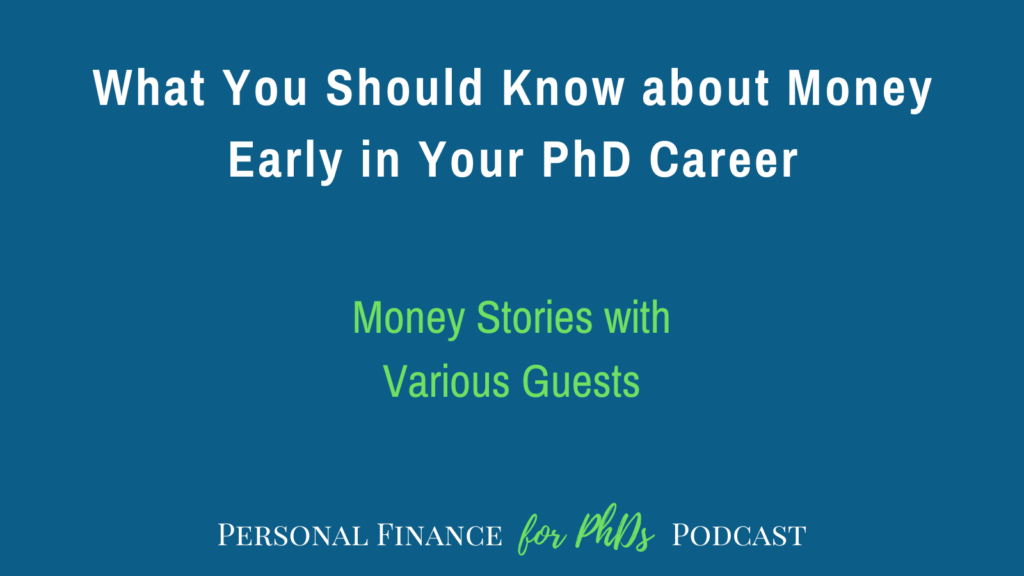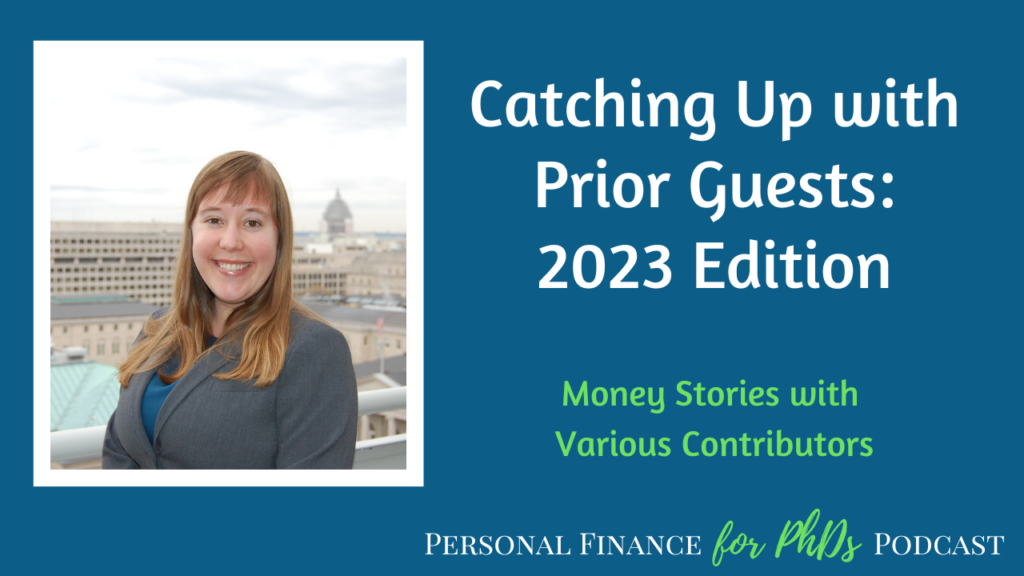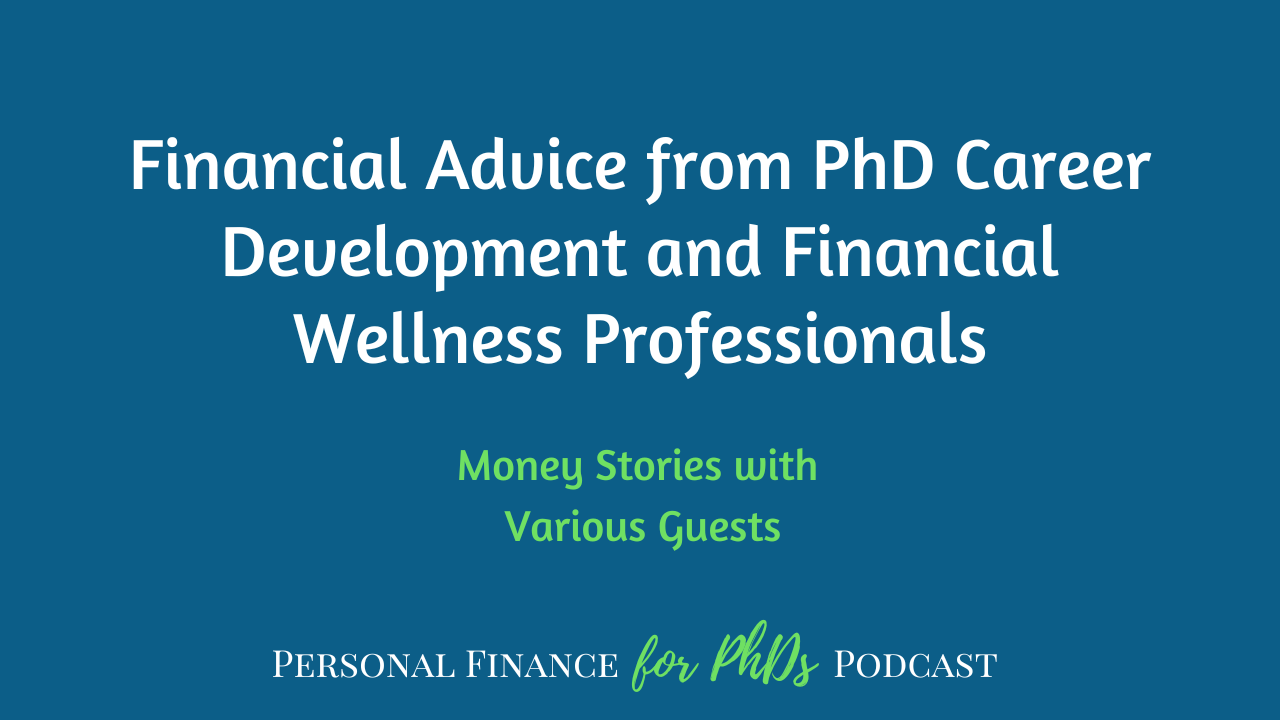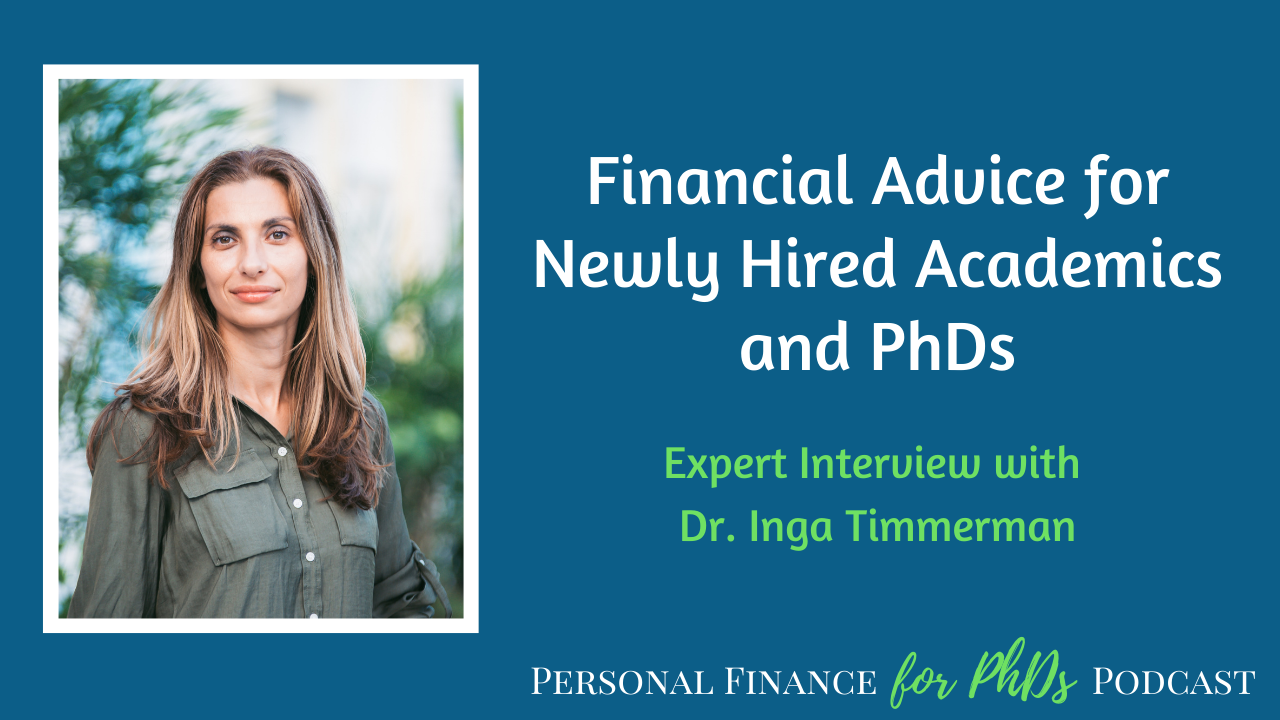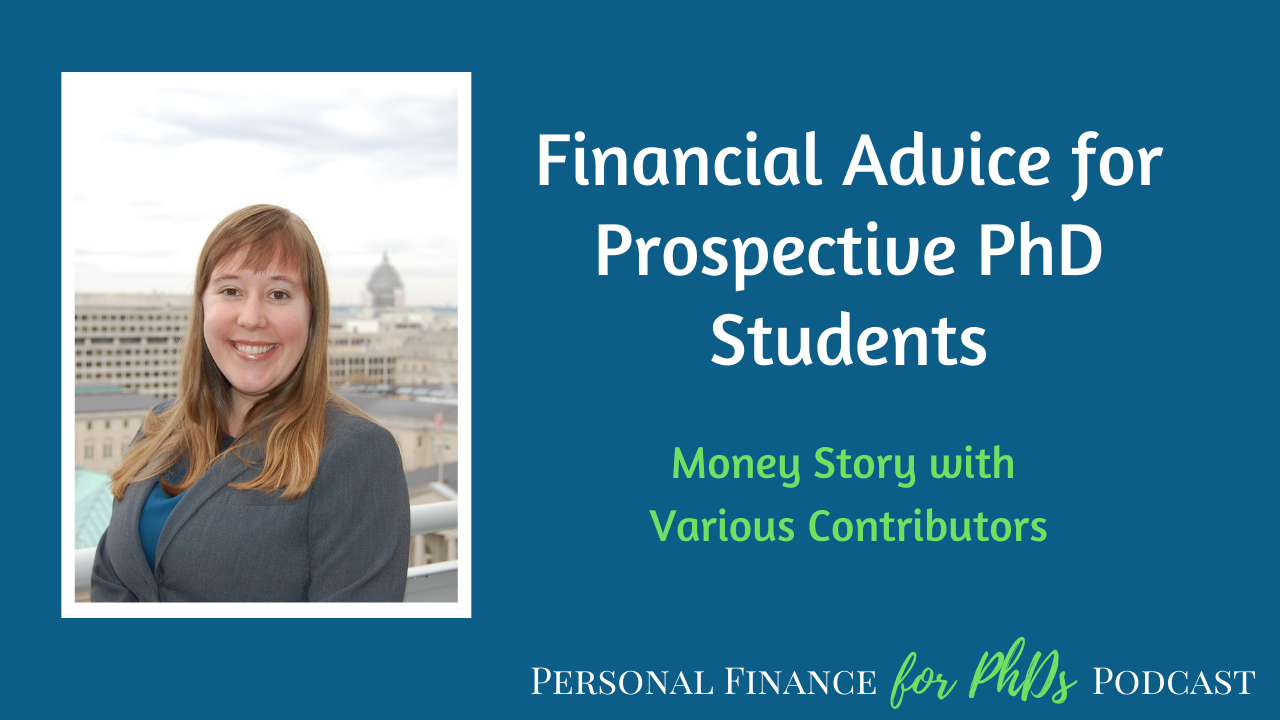In this episode, Emily explains how to live on time with your finances. Living on time means maintaining financial margin in your life to be able to absorb unexpected occurrences in your income or spending. When you’re behind in your finances, your income is going out the door right after you receive it, you have balances on your credit cards that you can’t pay off until your next paycheck comes, and/or you are unprepared for the next manual tax payment that is required of you. This may be true even if you’re not experiencing financial consequences such as interest payments on debt. The good news is that it’s very simple, though not necessarily easy, to transition to living on time once you know what it means.
Links Mentioned in the Episode
- PF for PhDs One-on-One Financial Coaching
- Host a PF for PhDs Seminar at Your Institution
- Emily’s E-mail Address
- PF for PhDs Subscribe to Mailing List
- PF for PhDs Podcast Hub
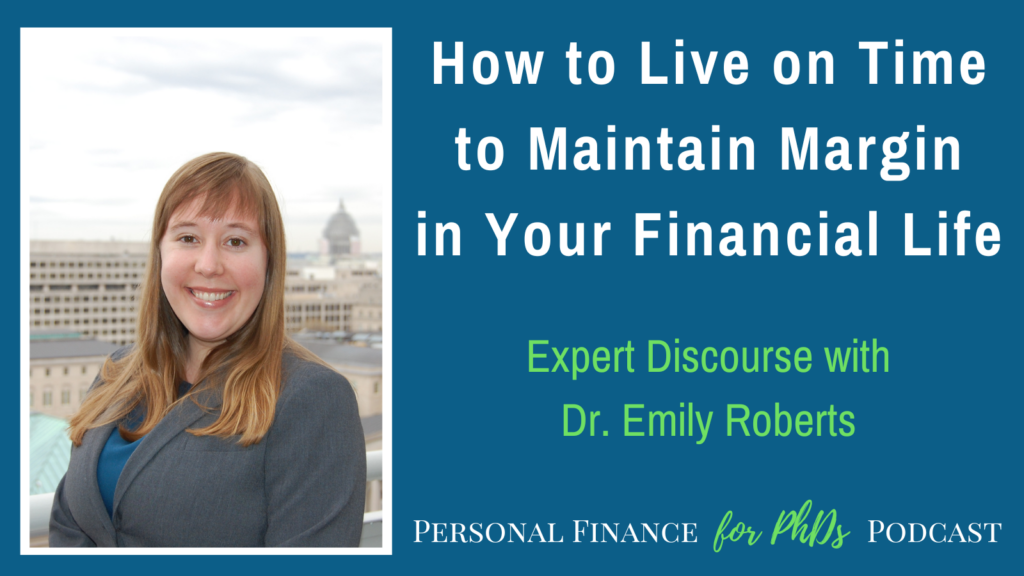
Introduction
Welcome to the Personal Finance for PhDs Podcast: A Higher Education in Personal Finance.
This podcast is for PhDs and PhDs-to-be who want to explore the hidden curriculum of finances to learn the best practices for money management, career advancement, and advocacy for yourself and others.
I’m your host, Dr. Emily Roberts, a financial educator specializing in early-career PhDs and founder of Personal Finance for PhDs.
This is Season 21, Episode 2, and today is a solo episode from me on how to live on time with your finances. Living on time means maintaining financial margin in your life to be able to absorb unexpected occurrences in your income or spending. When you’re behind in your finances, your income is going out the door right after you receive it, you have balances on your credit cards that you can’t pay off until your next paycheck comes, and/or you are unprepared for the next manual tax payment that is required of you. This may be true even if you’re not experiencing financial consequences such as interest payments on debt. The good news is that it’s very simple, though not necessarily easy, to transition to living on time once you know what it means.
I am delighted to announce that I am now offering one-on-one financial coaching! If you are a PhD or PhD-to-be in the US, I would be happy to serve as your financial coach. I can help you prioritize your financial goals, brainstorm and refine ideas for reducing spending, manage your side hustle income, start investing, prepare for tax season, set up a functional budget, evaluate a stipend or salary offer against your expected living expenses, and much more. What I can’t do is give you individualized investment or tax advice, but beyond that, it’s really open. As of now this coaching is structured as one-time appointments, so there’s no big commitment and you can book just one session or multiple at whatever interval makes sense to you. You can view my rates and book a free 15-minute initial call at PFforPhDs.com/coaching/. During that call, you’ll introduce yourself and your financial questions to me, I’ll let you know if we’re a good fit for a coaching relationship, and we’ll decide how you can best prepare for our first session together.
You can find the show notes for this episode at PFforPhDs.com/s21e2/.
Without further ado, here’s my solo episode on living on time.
Living on time is a concept I touch on in some of my financial education workshops, but I don’t always have time to expound and explain it completely, and it can be confusing. I decided to create this episode to go into detail about what I mean by it and how to enact it in your financial life. Also, this isn’t a concept that I really see other financial educators cover in depth so I can’t refer you to a book or similar resource. It’s not that mysterious or anything, as you’ll see, it’s probably more that the educators don’t have lower-income people front of mind for their teaching.
What Does It Mean to Live on Time Financially?
The basic concept here is that you shouldn’t unintentionally obligate your future income to pay for your current or past expenses. Basically, I’m encouraging you to not slide unknowingly into debt, although the debt I’m cautioning you about doesn’t always look like you might expect. I’ll share in a moment the three main ways this can easily happen.
The reason that I bring this up is that funded graduate students and others who live paycheck-to-paycheck, either habitually or occasionally, are particularly susceptible to not living on time and experiencing related consequences, such as overdraft fees, credit card interest, and financial stress.
What I’m going to suggest to you is a new way to be aware of your cash flow, i.e., your income coming in and your expenses going out, and that you exercise discipline to align with this concept of living on time. If you aren’t currently living on time, you are living with little or no margin in your financial life. When your financial life is going okay, do your best to live on time and create margin, so that the margin is there for you to access when your financial life is not going okay. In a way, this is an extension of the common financial advice to build an emergency fund.
Two more notes before we dive into what it means to live on time:
First, debt is a financial tool that is available to you. It’s not immoral or wrong to take out debt or be in debt. Debt is to various degrees financially damaging, so you should certainly carefully consider the type and amount of debt you take out. So when I said earlier that you shouldn’t unintentionally obligate your future income to pay for your current or past expenses, I’m not speaking about debt that you have intentionally taken out, such as student loans, a car loan, a mortgage, etc. In fact, I would rather you have a little more well-considered debt than to habitually live behind.
Second, I’m not at all shaming you for not living on time, if in the course of this episode you discover that you aren’t. I would venture that the vast majority of Americans do not practice what I’m about to outline. There are frequent instances in my own life when I’m not living on time and am eating into margin that I created in the past. That’s okay, that’s what it’s there for, but when you emerge from that tougher period, you should try to get back to living on time. Going back to the analogy of an emergency fund, your emergency fund is available for you to use, and after you spend some of it down, you should work gradually to build it back up so that it’s there for you the next time you need it.
Okay, enough beating around the bush, let’s get down to what I define as living on time financially.
1) All your income from one month goes to funding the next month’s spending.
In my view, monthly budgeting cycles make the most sense because so many of your bills are due once per month, including, virtually always, your largest bill, your rent or mortgage payment. A month is also long enough to average out most of your more frequent consumption-based expenses like groceries, car gas, eating out, etc. So if we are going to use a monthly cycle for our expenses, I also suggest that you create a monthly cycle for your income. Specifically, all the income that you bring in the course of a month funds the next month’s expenses. All of the income you receive in June should go toward funding your July expenses. That means that on July 1st, you should have sitting in your checking account all of your income from June, plus any buffer amount of money that you might like to keep in your checking account. That June income will be spent down over the course of July. All of the income you receive in July should be preserved for your August expenses.
If you are paid a monthly or bimonthly salary, this is a really simple and natural cycle to adopt. Things get a little more interesting when you are paid biweekly, weekly, or at some other cadence or have an income that varies with number of hours worked or amount of work accomplished. In those cases, the amount of money you take in over the course of a month will change, perhaps every month. I’ve seen people adopt really complex and confusing systems for handling their bills when their paycheck dates and amounts move around from month to month. They do this because they are using their income as soon as it comes in to pay expenses. In my view, it’s much simpler to wait. Collect all the income in the course of a month, know how much it is, and then use it in the subsequent month. You can even plan a unique monthly budget for every month if this happens a lot, but it’s all going to be based on money already received, not money you expect to receive.
If you are paid less frequently than monthly, which happens with some fellowships, your version of living on time does not include all income in one month funding the next month’s expenses because you don’t have income in every month. Tune back in later in this podcast season for a whole episode devoted to managing your unique income frequency.
In fact, the more of a time buffer you can create between when you receive your income and when you start spending it, the better, up to a point. When I was in graduate school, depending on my funding source, I was paid either on the 25th of the month or the last day of the month. I didn’t have much of a buffer because I was turning around and starting to pay expenses from that income within a day or a few days. After I finished grad school, I set up my business to pay my salary on the 15th of each month so that I could let that money rest, so to speak, for about two weeks before I started spending it in the subsequent month. My husband is currently paid bimonthly on the 15th and last day of the month. We’ve backed up our time buffer even a little further so that we let those paychecks rest for between half a month and a full month before we start to spend them, meaning that the money we will spend in July was received on May 31st and June 15th.
2) Use credit as debit and don’t slide into buy now pay later.
We’ve discussed living on time with respect to your income, and now I want to turn to living on time with respect to your expenses. The biggest danger in this area is the use of debt to delay actually paying for your expenses. This, too, can make budgeting much messier than it has to be.
The principle here is to use credit cards, if you choose to use them at all, as if they were debit cards. That means that every time you make a charge on a credit card, you already have the money to pay for that purchase in your checking account. You could pay the expense in cash, with debit, or with credit.
It’s all too easy with credit cards to push forward actually paying for the purchases you make for a few weeks or over a month. The same goes for buy now pay later schemes like Affirm and Afterpay.
To go back to our example from the last section, the money that you receive in June funds July’s expenses. Those July expenses can be put on a credit card, but you should be able to pay off the credit card in July with that June money. In fact, if you haven’t paid much attention to this before, I suggest that you pay your credit cards off completely at the end of each month to make sure you aren’t carrying any charges forward.
Getting behind with credit cards looks like making charges in July that you actually pay for in August or even September. If you combine it with using your income as soon as you receive it, you might be using August or even September income to pay for charges you made in July. That’s what I mean about unintentionally obligating your future income. You’re behind. And you didn’t even mean to be.
3) Keep up with your tax obligations.
This point only applies to people who are not having income tax automatically withheld from their paychecks, such as grad students, postdocs, and postbacs paid by fellowships or training grants who are US citizens, permanent residents, and residents for tax purposes.
Automatic income tax withholding by employers is very convenient for the individual. A more or less appropriate fraction of each paycheck is set aside and sent to the IRS and your state tax agency on your behalf to pay your annual income tax obligation. You never receive the money in your paychecks.
However, if you are not having income tax automatically withheld from your paychecks, that doesn’t mean you don’t owe the income tax. You will have to pay it at some point, whether it’s when you file your annual tax return or throughout the year via estimated tax payments.
For these individuals, I recommend setting up what I call a system of self-withholding, which means that from each paycheck, you automatically transfer the amount of money you expect to pay in income tax to a savings account dedicated to sequestering this money from the money available to you to spend. When it comes time to pay the IRS and your state tax agency, you pull the payment from this particular savings account, which has been pre-funded with the amount due.
Therefore, this is one more component of ‘living on time.’ If you don’t set aside the money for these tax payments, and perhaps spend it or allow it to leave your bank account for some other purpose, you will be caught out when the payment comes due and need to set up a payment plan with the IRS if you can’t pay—once again, sliding unintentionally into debt.
Living on time means preparing for your income tax bill with every paycheck that you receive, just like when you had an employer doing it for you.
I actually didn’t plan it this way, but it turns out that the day this episode drops, Monday, June 16, 2025, is the estimated tax payment deadline for quarter 2. And that is strange because June is the sixth month of the year, not the seventh. You would think that each quarter, for estimated tax purposes, would be three months long, with the payment due date coming midway through the following month, but you would not be correct. For whatever reason, the payments are due in mid-April, mid-June, mid-September, and mid-January, implying quarter lengths of three, two, three, and four months. Oh, but you still owe one-fourth of your calculated annual obligation on each due date. So to live on time, not only should you save a fraction of each paycheck for your future tax obligations, but you need to make sure that you save extra in quarter 2 or prior quarters to meet that early deadline.
Commercial
Emily here for a brief interlude.
Would you like to learn directly from me on a personal finance topic, such as taxes, goal-setting, investing, frugality, increasing income, or student loans, each tailored specifically for graduate students and postdocs? I offer seminars and workshops on these topics and more in a variety of formats, and I’m now booking for the 2025-2026 academic year.
If you would like to bring my content to your institution, would you please recommend me as a speaker or facilitator to your university, graduate school, graduate student association, medical school, postdoc office, or postdoc association? My workshops are usually slated as professional development or personal wellness. Orientations, postdoc appreciation week, or close to the start of the academic year would be a perfect time for tax education or general personal finance content. Ask the potential host to go to PFforPhDs.com/financial-education/ or simply email me at [email protected] to start the process.
I really appreciate these recommendations, which are the best way for me to start a conversation with a potential host. The paid work I do with universities and institutions enables me to keep producing this podcast and all my other free resources. Thank you in advance if you decide to issue a recommendation!
Now back to our interview.
Why Attempt to Live on Time
So why should you endeavor to live on time the way I have defined it, even if you don’t always live up to the ideal?
Think about what could happen if you don’t live on time—if you spend your paycheck the day after it comes in and put charges on a credit card that you aren’t able to pay off for a month or two?
First, the income side. If anything goes awry with your income and you don’t receive a paycheck when you expected it in the amount that you expected, immediately you’re overdue on bills or unable to buy gas or food without accessing debt. If you get sick and miss work and either don’t have paid sick leave or you run out, your next paycheck will be smaller than usual or nonexistent. If you depend on side hustle income, but it dries up suddenly, you may find yourself in a bind. If you are on fellowship, your university might play fast and loose with your paycheck date as they don’t have the same legal obligation to stick to a schedule that they would if you were employed. I’ve seen this happen over multiple years to fellows in the University of California system, for example, who expected a stipend disbursement on September 1, but it didn’t come until over a week later. And earlier this spring, the paychecks of NSF postdoc fellows arrived late because of interference by the Trump administration. Of course, none of that is the fault of the individual, but they are the ones to suffer the consequences of a late paycheck, so it’s best to be proactive to build in some margin. When you live on time, a paycheck coming late or in a smaller amount than anticipated is still a problem, but you’ve bought yourself some time to figure out how to pivot.
Second, the expenses side. If you’re spending money you don’t already have in your bank account on a regular basis, what happens when an unexpected expense arises or an expense is larger than you anticipated? You have no margin to absorb these expenses on a temporary basis so that you can figure out your next move. Maybe you’ll put the expense on a credit card, but that tips you into carrying credit card debt instead of managing to pay it off by the due date to avoid interest accruing. If you maintain margin on your credit cards through the habit of living on time, breaking that habit once in a while by making a charge you can’t pay for immediately gives you a handful of weeks to adjust your spending in other areas so that you can ideally pay it off by the due date.
You can see from these examples that it’s not a terrible thing to eat into this margin when you need to to buy yourself time. But if you never maintain the margin in the first place, sliding unintentionally into a type of debt, it can’t serve its purpose when you hit a speedbump in life.
Of course, if you do have an emergency fund, you could access it to handle a small or missed paycheck or an unexpectedly high expense. I just consider the emergency fund to be the backup layer to the margin that’s created by living on time.
In fact, I think you should get on time with your finances even before starting to build your official, separate emergency fund.
How to Start Living on Time
If you are not currently living on time in the most ideal sense, how do you start moving in that direction? The answer is perhaps disappointingly simple. You have to spend less than you earn—even more so than what you’ve been doing to this point.
The ultimate outcome I want for you is to start each month with zero balance on your credit cards and a checking account balance equal to all of your income from the prior month. You can also add a buffer of $500 or $1,000 if you feel more comfortable with that, and I would recommend that if you are operating off of a once-per-month paycheck that arrives late in the month.
As a variation on this, you don’t actually need to clear the balance off of your credit cards at the end of each month as long as you have enough in checking to cover the balances on top of your prior month’s income and you have all the cards on autopay. However, that means your target checking account balance will vary every month.
How do you get from where you are to your target checking account balance and zero balance credit cards? You have to save money. I suggest first trying to do so inside of your checking account because that is where the money ultimately needs to go. You basically need to see your checking account balance gradually increase month over month until you reach your target. But that process can be difficult to track with money cycling in and out all the time, so alternatively you can save money in a separate savings account until you reach your goal and then transfer it into checking and pay off your credit cards in one fell swoop. I would only recommend this method if you’re not accruing interest on credit card debt. After you reach your target checking account balance, all you have to do is maintain the correct balance. Or, if you use the margin for one reason or another, restore it as soon as you’re able to by, you guessed it, saving money.
How do you save money? It’s not really the topic of this episode, but your choices are essentially to earn more, spend less, or redirect your existing savings rate. Your mileage will definitely vary on which of those options is most accessible.
If you are currently saving money for a different goal, I would suggest pausing progress on that goal until you’re living on time. The exception would be if your goal is to repay high interest rate debt, in which case that can take precedence. Whatever goal you’re working toward would get disrupted anyway if you had a loss of income or an unexpected expense.
If this is a goal that can be accomplished in the short term, the most immediate way to increase your savings rate is likely to spend less, so try some temporary fasts from discretionary spending such as eating out, alcohol, and entertainment and re-evaluate your small, fixed expenses like subscriptions.
If this is a longer-term goal, you can try to increase your income through side hustling, if that’s permissible, by winning a fellowship or grant, or negotiating. I also recommend re-evaluating your large, fixed expenses such as housing and transportation and creating new habits to reduce your grocery spending.
In closing, I want to emphasize that living on time is an ideal, and I don’t expect you and you shouldn’t expect yourself to live up to it 100% of the time. However, if you make it a general practice to reserve all of your income from one month to fund the next month’s spending, use your credit cards as if they were debit cards, and keep up with your tax obligations, you will have financial margin in your life to absorb the smaller shocks that you might experience like a late paycheck or unexpected expense. To get to living on time, you just have to save money so that your checking account balance grows to your target level at the start of each month.
Outro
Listeners, thank you for joining me for this episode!
I have a gift for you! You know that final question I ask of all my guests regarding their best financial advice? My team has collected short summaries of all the answers ever given on the podcast into a document that is updated with each new episode release. You can gain access to it by registering for my mailing list at PFforPhDs.com/advice/.
Would you like to access transcripts or videos of each episode? I link the show notes for each episode from PFforPhDs.com/podcast/.
See you in the next episode, and remember: You don’t have to have a PhD to succeed with personal finance… but it helps!
Nothing you hear on this podcast should be taken as financial, tax, or legal advice for any individual.
The music is “Stages of Awakening” by Podington Bear from the Free Music Archive and is shared under CC by NC.
Podcast editing by me and show notes creation by Dr. Jill Hoffman.
